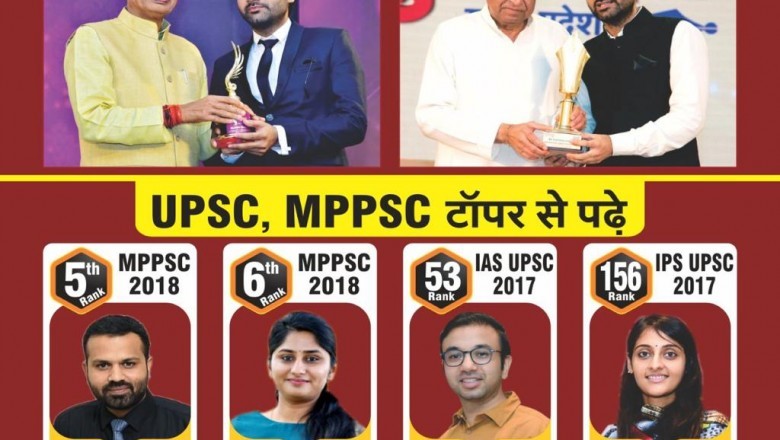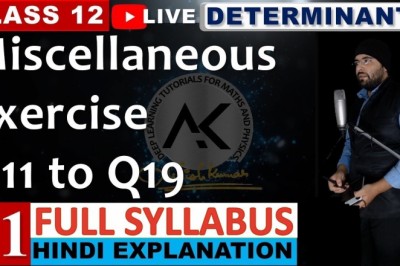views

This is aperennial question I get asked the most. And it’s understandable too. Manyaspirants who begin their MPPSC preparation areclueless about this exam’s demands.
Q.Is coaching necessary?
Think of an elitesportsman like Virat Kohli. Does he have a personal coach? Yes, he does. Butwould you say his career success is purely down to his coach? Of course not.Kohli trains and suffers day in day out, practices consistently to learn andimprove his game. His self-discipline, hard work and the burning determinationto excel at the game is what makes him the elite player he is.
Same goes withsuccess in the MPPSC exam. Coaching merely helps you, it does not ensure you arank. Your self-study, consistency, and the hard work you put in sitting atyour study table matters far more than what you do in coaching classes.
So if you areattending coaching classes, do take their mppsc notes, but you should not rely excessively on them andneglect standard books. In my first Mains, I did this mistake of depending oncoaching notes disproportionately— I barely read any of the standard books.When I wrote my first Mains in 2012, my lack of conceptual clarity was evident.Unsurprisingly, I failed to get an interview call.
Always rememberthat roughly, not more than 25-30% of your preparation should depend on mppsc coachingclasses. To say that without coachingyou cannot crack UPSC is to tell a lie. There are people who put in even that25% of work by themselves and have cracked this exam (that is, they might haveread coaching notes, but did not attend any classes.) So, it depends on yourpersonal belief, self-discipline and your basic level of knowledge to determinewhether you need coaching.
Suppose you knowwhat standard books to study, what coaching notes to refer to, and by readingthem you can understand the subject, that’s brilliant and you don’t needcoaching.
On the other hand,if you are clueless about the exam process or the books you need to study,coaching institutes will help you get a broad idea. But as I said, you still must-readstandard books, make required notes and put in the work to outshine yourcompetition.
Q.How do you compare coaching in Delhi versus elsewhere?
As I had said,coaching does not constitute more than 25-30% of your preparation. And there’snothing profound about coaching institutes in Delhi.
For thosepreparing in far flung areas, if you cannot afford to go to Delhi, that’sperfectly alright. You can get MPPSC notes of all the major coaching institutes in mostcities. So make a trip once to your nearby city, buy them from a bookstore andstudy on your own.
Also, I believeinternet has truly democratised information and made it accessible even torural areas. These days many institutes are providing coaching classes viavideo lectures. You can opt for them too.
Moreover, onlinewebsites have emerged as brilliant and affordable alternatives to traditionalcoaching institutes. So if you cannot go to Delhi to take coaching, you are notlosing out on anything.
Q.How helpful are coaching notes? Can they substitute standard books?
Standard books areimportant because they are written from the ground up and they form thefoundation of your knowledge. Once you read standard books, reading coachingnotes not only becomes much easier, but you can also see where in that bigpicture does a small topic fit in.
The problem withreading just the mppsc coachingnotes is that they fail to you giveyou such big picture perspective. What you will be left with are fragmentedconcepts and broken knowledge which doesn’t stick for long in your memory. Forlong term memory, we need a topic’s context which is why you should alwaysstart with standard books.
For example, when I started Anthropology, I first read Ember & Emberto get an overview of the subject. Afterward, when I referred to Sharma Academymppsc coaching material, I could clearly see how a particular topic suchas Primate Adaptation fit into the larger conceptof Human Evolution. This is why standard books areindispensable.
While readingcoaching notes, remember these:
§ Coaching notes are helpful and easy to revisebefore the exam. But they can only supplement but never substitute standardbooks.
§ Always map your notes onto the chapters and topicsin syllabus. Most coaching institutes do not cover the syllabus entirely. Evenif they do, they usually rush through some chapters. So when you see a topic notcovered well in your notes, read on your own from other sources and make notes.
§ Coaching notes and material come in handy to covera specific topic. For example for a topic like Govt schemes, instead of youlabouring to compile them from ministries’ websites, it’s better that you buy acompilation booklet of any institute. Smart work saves you a lot of time.
§ You have to remember that UPSC is not at all like agraduation exam. In college, it’s fairly easy to read just the notes and scorereally well. But in UPSC, the questions are of higher standard and of deeperanalytical depth. None of the questions usually come directly from yourcoaching notes. It’s your clarity of concepts— especially in optional— thatwill help you write good answers.












